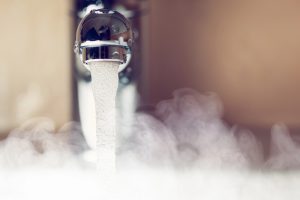Figuring out how to best heat your home is an important decision that every homeowner must face. The good news is: you have choices.
There are a few different popular methods for heating your home, including heat pumps and furnaces. The bad news is: more choices mean more information to sift through. Luckily, we’re here to help. Here’s everything you need to know about the benefits of a heat pump vs. furnace so you can make the right choice for heating your home.
What’s a Furnace?
Before we can talk about how these two methods differ, we should probably explain exactly what each of them is.
Furnaces use fuel to generate heat and deliver warmth throughout your home. They can run on either oil or gas, and all of them consist of four main components:
- Burners — these deliver and burn the fuel.
- Heat Exchangers — these hold the toxic gases that are created when the fuel is burned. The gases are then vented away from your home to keep you and your family safe.
- Blower — this helps distribute the warm air through your home’s air ducts. Read more about furnace blowers here.
- Flue — the toxic gases created by burning fuel are diverted through the flue to the outside.
There are many other parts of a furnace, but these are the most important, functionally speaking.
What’s a Heat Pump?
While furnaces create their own heat from burning fuel, heat pumps transfer heat by drawing the heat from the outdoors (even when the weather is cold) and transferring it into your home. The heat is absorbed through pressurized refrigerant lines and then released throughout your home.
Which is Better?
The answer to which is better between a heat pump vs. furnace isn’t cut and dry. Neither is categorically better or worse than the other, but one is likely more suitable for your individual situation.
Each of them has its own unique strengths, and each one also functions better and more efficiently in a certain climate.
Why You Should Consider a Furnace
There are a few situations that would make a furnace the right choice for heating your home. Here are some of the biggest benefits that a furnace can offer.
Furnaces work better than heat pumps in cold climates.
This is the biggest reason why you should consider a furnace if you’re deciding between a heat pump vs. furnace. While heat pumps can draw heat from air that’s below freezing, they function less efficiently — and require more energy — if the weather is colder outside. This is one of the reasons you should consider a gas furnace when comparing a heat pump vs. gas furnace.
Because furnaces generate their own heat by burning fuel, the outside temperatures have no impact on the way your furnace functions. A good way to decide whether your climate is cold enough for a furnace is by referencing the U.S. Depart of Energy’s Climate Zone Map. If you live in zones 4 through 7 on the map, you should consider a furnace over a heat pump.
Furnaces are quieter than heat pumps.
When both systems are operating as they should, heat pumps are typically a lot noisier than furnaces. Heat pumps are known for making clicking noises while operating, which occurs when the compressor that circulates refrigerant turns on or off. In fact, many new heat pump owners are frequently concerned by the noises their heating system makes when they’re first getting used to it. If your furnace is making noise, however, that may be a sign it’s not functioning properly. Check out these tips on what to do.
Why You Should Consider a Heat Pump
Heat pumps are better if you live in climate zones 1 through 3.
On the map linked above, people living in climate zones 1 through 3 would likely benefit more from installing a heat pump in their home than a furnace.
Heat pumps don’t take up as much space as furnaces.
Furnaces are installed inside the home and are required to have 30 inches of clear space on all sides for safety reasons, per manufacturer instructions and local business codes. Part of the furnace — the compressor — is also installed outside and requires two feet of clear space on all sides for safety.
Heat pumps, on the other hand, don’t require any clear space for safety. This is because they don’t use any combustible fuel the way furnaces do. Some heat pumps can even be mounted high on the wall, which means that no floor space needs to be compromised.
Heat pumps can both cool and heat homes.
Furnaces only create heat, but heat pumps are a little bit different. They can distribute warm air through your home in the winter and cool air through your home in the summer, serving a dual function. When the outside air is hot, heat pumps work very similarly to air conditioners. This is a huge check in the “pro” column for heat pumps because it means homeowners only need one system, rather than a heating system and a cooling system. When comparing electric heat pumps vs. gas furnaces, this is one area where heat pumps excel.
Heat pumps are less expensive to operate.
This is a notable advantage for anyone leaning towards a heat pump when comparing a heat pump vs. electric furnace. However, it’s important to note that the cost of operating a heat pump depends on the climate you use it in and the temperature of the air outside that it draws heat from.
Heat pumps also cost about the same as an air conditioner to cool your home during the summer, so if you live in one of the ideal zones, heat pumps might be the best choice for you.
Conclusion
Heat pumps and furnaces each have their strengths and weaknesses. The one you decide to install in your home should depend on several factors and considerations unique to your situation. These include the climate where you live, the space available in your home, your noise tolerance, and whether you need a cooling system as well. All of these will help you decide which system is the best for you and your family. If you require professional help regarding plumbing or HVAC services contact AHWA today.
If you’re looking for another comparison for your HVAC system choices, you can check out our article about gas vs. electric furnace.














